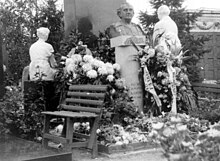Shmuel Halkin
Shmuel Halkin | |
|---|---|
שמואל האַלקין | |
 Halkin's grave with sculptural likeness in Novodevichy Cemetery | |
| Born | Shmuel Zalmanovich Halkin December 5, 1897 |
| Died | September 21, 1960 (aged 62) |
| Resting place | Novodevichy Cemetery |
| Other names | Samuil Zalmanovich Galkin |
| Occupation | Poet |
| Relatives |
|
Shmuel Zalmanovich Halkin (Yiddish: שמואל האַלקין; Belarusian: Самуіл Залманавіч Галкін, romanized: Samuil Zalmanavič Halkin; Russian: Самуил Залманович Галкин, romanized: Samuil Zalmanovich Galkin; December 5, 1897 – September 21, 1960), also known as Samuil Galkin, was a Soviet poet who wrote lyric poetry and translated many writers into Yiddish.
Biography[edit]
Halkin was born in Rahachow, in what was then the Russian Empire (now Belarus) on December 5, 1897.[1][2][3] He was the youngest of nine children in a Hasidic, Jewish household and a cousin of Simon and Abraham Halkin.[4][5]
Halkin was interested in Jewish culture as a child, later as a young man he would become interested in painting and literature before ultimately deciding to become a poet.[5][6] In his youth he wrote his poetry in Hebrew, but from 1921 onwards he wrote in Yiddish.[7]
Halkin's first poems were published in 1917 in an anthology. He would then move to Moscow in 1922, after having lived in Kiyv for a year, where he published his debut collection Lider (Songs) with the help of David Hofstein.[6][8][9] This would not only be the foundation of his career, but part of the foundation of Soviet Jewish poetry.[10] These and his later works would earn his lyric poetry acclaim.[11][2]
During World War II Halkin was a member of the Jewish Anti-Fascist Committee and served on the editorial board of its journal Eynikayt, during which he wrote about the Shoah.[1][8] Halkin would develop a cordial relationship with fellow committee member and neighbor Peretz Markish.[12] He was arrested in 1949 alongside other members of the committee but was spared execution alongside them in 1952, likely due to a heart attack he suffered while imprisoned that hospitalized him. He would go on to be released in 1955.[8][13]
Along with his original works, Halkin was known for translating the poems of Pushkin, Yesenin, Blok, Mayakovsky, Shakespeare's tragedy King Lear into Yiddish.[1][8] The last of which was directed by Sergei Radlov and produced at the Moscow State Jewish Theatre.[14]
Halkin supported zionism, and would be criticized for his advocacy of Jewish nationalism.[9]
Halkin died in Moscow, Soviet Union on September 21, 1960, on the second day of Rosh Hashanah.[1][15] He was buried in Novodevichy Cemetery.
Following his death more of Halkin's works would be posthumously released, notably his work on the chorus of Mieczysław Weinberg's sixth symphony.[16]
Musical settings[edit]
- Mieczyslaw Weinberg: 6 Jewish Songs op.17 1944, in Yiddish.
References[edit]
- ^ a b c d "Еврейский поэт Самуил Галкин". www.languages-study.com (in Russian). Retrieved 2021-12-08.
- ^ a b Jews and the Jewish People. Vol. 1–2. Contemporary Jewish Library. 1960.
- ^ Prokhorov, Aleksandr Mikhaĭlovich (1973). Great Soviet Encyclopedia. Macmillan.
- ^ Krutikov, Mikhail (October 27, 2010). "Halkin, Shmuel". yivoencyclopedia.org. Retrieved 2021-12-08.
- ^ a b Rubin, Dominic (2013). The Life and Thought of Lev Karsavin: "Strength made perfect in weakness...". Rodopi. ISBN 978-94-012-0914-4.
- ^ a b Gutsche, George J. (1989). "The" Modern Encyclopedia of Russian and Soviet Literatures: Including Non-Russian and Emigre Literatures. Academic International Press. ISBN 978-0-87569-038-4.
- ^ Branover, Herman; Berlin, Isaiah; Wagner, Zeev (1998). The Encyclopedia of Russian Jewry: Biographies, A-I. Jason Aronson. ISBN 978-0-7657-9981-4.
- ^ a b c d Ozerov, Lev (2018-12-04). Portraits without Frames. New York Review of Books. ISBN 978-1-68137-269-3.
- ^ a b Cohn-Sherbok, Dan (2010-01-07). Dictionary of Jewish Biography. A&C Black. ISBN 978-1-4411-9784-9.
- ^ סאָוועטיש היימלאנד (in Yiddish). סוָועטסקי פיסאטעל. 1987.
- ^ Rukhadze, Avtandil, ed. (1975). Jews in the USSR: A Collection of Articles. Novosti Press Agency Publishing House.
- ^ Markish, Esther (1978). The Long Return. Ballantine Books. ISBN 978-0-345-24803-9.
- ^ Gromova, Natalia (2018-01-01). Moscow in the 1930s: A Novel from the Archives. Glagoslav Publications. ISBN 978-1-78437-973-5.
- ^ Zolotnistky, David (2021-08-29). Sergei Radlov: The Shakespearian Fate of a Soviet Director. Routledge. ISBN 978-1-134-36073-4.
- ^ "Shmuel Halkin, Prominent Jewish Writer, Dies in Moscow; Was 61". Jewish Telegraphic Agency. 1960-09-27. Retrieved 2021-12-08.
- ^ Schoenbaum, David (2013). The Violin: A Social History of the World's Most Versatile Instrument. W. W. Norton & Company. ISBN 978-0-393-08440-5.
- 1897 births
- 1960 deaths
- People from Rahachow
- Jewish writers from the Russian Empire
- Belarusian male poets
- Belarusian Zionists
- Yiddish-language poets
- Translators to Yiddish
- Yiddish culture in Russia
- Soviet Jews
- Soviet male poets
- Jewish anti-fascists
- Soviet prisoners and detainees
- Burials at Novodevichy Cemetery
- Jewish biography stubs
- Soviet people stubs
- Belarusian people stubs
- European poet stubs
